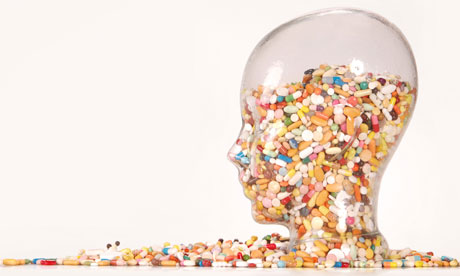Cognitive enhancers have been used to treat people with neurological or mental disorders, but there is a growing number of healthy, "normal" people who use these substances in hopes of getting smarter. Although there are many companies that make "smart" drinks, smart power bars and diet supplements containing certain "smart" chemicals, there is little evidence to suggest that these products really work. Results from different laboratories show mixed results; some labs show positive effects on memory and learning; other labs show no effects. There are very few well-designed studies using normal healthy people.
 Some smart drugs can be found in health food stores; others are imported or are drugs that are intended for other disorders such as Alzheimer's disease and Parkinson's disease. There are many Internet web sites, books, magazines and newspaper articles detailing the supposed effects of smart drugs. There are also plenty of advertisements and mail-order businesses that try to sell "smart drugs" to the public. However, rarely do these businesses or the popular press report results that show the failure of smart drugs to improve memory or learning. Rather, they try to show that their products have miraculous effects on the brain and can improve mental functioning.
Some smart drugs can be found in health food stores; others are imported or are drugs that are intended for other disorders such as Alzheimer's disease and Parkinson's disease. There are many Internet web sites, books, magazines and newspaper articles detailing the supposed effects of smart drugs. There are also plenty of advertisements and mail-order businesses that try to sell "smart drugs" to the public. However, rarely do these businesses or the popular press report results that show the failure of smart drugs to improve memory or learning. Rather, they try to show that their products have miraculous effects on the brain and can improve mental functioning.Smart drugs work by selectively enhancing your brain powers. Smart drugs allow you to exaggerate abilities you already have. They increase one or more brain neurotransmitters (cascading), increasing blood flow to the brain (flooding), increasing permeability of neurons membranes (plasticity), and some even go so far as to turn on smart genes (upgrading).
The medical name for smart drugs is nootropics, a term coined by psycho chemist Dr.Giurgea - the grandfather of modern smart drugs. His creation, Nootropil (Piracetam) is so inherently safe that it can be purchased without a prescription.
Many of the positive effects of cognitive enhancers have been seen in experiments using rats. For example, scientists can train rats on a specific test, such as maze running, and then see if the "smart drug" can improve the rats' performance. But it is difficult to see how many of these data can be applied to human learning and memory.
Baylor University researchers have discovered a molecule called PKR, which regulates how neurons interact in memory-related tasks. When the molecule is genetically suppressed, another immune molecule called gamma interferon steps in. The understudy molecule is much better at increasing communication between neurons and making memory more efficient. By finding a chemical inhibitor for the PKR molecule the team realised it could generate the memory boost without using genetic engineering. They found a molecule that did the trick, and it could be used to develop drugs to help Alzheimer's patients combat memory loss. Likewise it could be used by people who don't have Alzheimers to turbo-charge their memories.
Research show 10% of UK students admit to taking ‘cognitive enhancing’ drugs to help them concentrate, stay up late and complete deadlines on time. This rises to 16% among US students. Professor Barbara Sahakian, a psychiatrist at Cambridge University, told the Independent: “People are starting to think about drug testing. Some of the students who don’t use cognitive enhancers may demand it because they are concerned about cheating. Some admissions tutors are also concerned about it.”
Ritalin, usually prescribed for attention deficit disorder, and Modafinil, prescribed for narcolepsy, are some of the most favoured ‘performance enhancers’ named by the report of a joint Academies workshop into Human Enhancement and the Future of Work. These drugs are being chosen by students and academics alike because they do not produce extreme changes in mood that usually accompany recreational use, such as a ‘high’ or ‘rush’, and do not lead to obvious physical dependence.
A 2011 study found that modafinil reduces impulsive behaviour and improves cognitive flexibility in sleep-deprived doctors. Unlike caffeine, which in higher doses is accompanied by tremor and heart palpitations, this is not seen with Modafinil. However neuroscientist Jack K Lewis blogged on Huffington Post UK about the dangers of believing the promise of such 'wonder' drugs. There are serious ethical implications of enhancements like these being necessary for jobs or degrees. Enhancement could benefit employee efficiency and even work–life balance, but there is a risk that it will be seen as a solution to increasingly challenging working conditions, which could have implications for employee wellbeing.
The secondary effects of drugs that have been sold as smart drugs, carries more then just a health risk, though this practice has been utilized by drug companies to resell a unsuccessful drug. Early adopters of technology and pressurized students are finding them selves searching unethical sources on the Internet. While short term usage carries the possible 10% enhancement, the long term effects have not been studied. As recreational drugs are slowly being accepted in studies for post traumatic syndrome and other benefits. The slow rise of smart drugs will no doubt prove to be a underground success, as rising cost of tuition fees and little job opportunities will induced desperation. The fallout could be a society split into two with the enhanced group dominating...



No comments:
Post a Comment